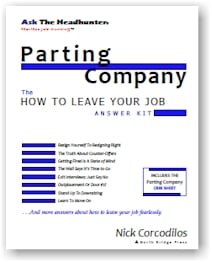In the June 30, 2015 Ask The Headhunter Newsletter, a reader is faced with the HR gantlet on his way out the door.
Question
I’m leaving my company and HR is asking me to sign all sorts of forms and documents. I’m faced with reams of legal-ese! I’m worried they’re going to slip in something that hurts me later. I also want to make sure I get documents that I might need later, and I want to avoid doing anything that might get me sued. Do you have any tips so I won’t get hurt while I make my way through the HR gantlet on the way out the door?
Nick’s Reply
 The path out the door, whether you quit or have been fired, is usually rushed and HR goes into high gear issuing orders and giving you paperwork to sign.
The path out the door, whether you quit or have been fired, is usually rushed and HR goes into high gear issuing orders and giving you paperwork to sign.
Some of the paperwork is for your own protection. For example, insurance and retirement account information. Some of it can indeed hurt you later. I can’t walk you through everything in a newsletter, but I can touch on some gotchas you should be aware of.
This is from the “Crib Sheet” section of my PDF book, Parting Company: How to leave your job, pp. 67-73.
- If you were fired after being put on a Personal Improvement Plan (PIP), obtain copies of relevant documents. Even if you don’t expect to take legal action, you may change your mind and your lawyer will need the information.
- If you are given a letter of separation that requires you to sign off, consider having an attorney review it before you sign. Don’t forfeit your rights in an effort to exit quickly. Protect yourself.
- Don’t leave your personal stuff in your office. Upon termination or resignation, you may not be able to retrieve it easily. Some employers will lock you out and pack what they believe is yours and ship it to you later. (See “Get your stuff,” p. 46.)
- Don’t use company technology to store personal information. If the laptop and phone belong to the company, so does what’s stored on them.
- If you work in sales, discuss who owns your customers and contact lists. Keep what’s yours, but don’t take what belongs to the company.
- If you’ve been involved in inventions or patents or proprietary information, make sure you understand who owns the rights. Be aware of any restraints you may have already agreed to, e.g., Non-Disclosure Agreements (NDA). Retain copies for your files and possibly for your attorney.
- If you’ve signed any Non-Compete Agreements (NCA), make sure you understand the restraints. NCAs usually define a time period, geographic region, named customers you may not call on, and other terms. Retain copies. [Note: NCAs are not legal in some jurisdictions. Employers want you to sign them anyway. Also be careful with NDAs — Non-Disclosure Agreements.]
- Do you anticipate a lawsuit for wrongful termination, age or sex discrimination, or sexual harassment? Before you do anything pertaining to your exit, consult an attorney. What you say or do during the exit process might be used against you. Don’t limit your options carelessly.
- Throughout your exit process, carry a notebook. Make it clear to HR that you are taking notes about commitments and representations made to you. To put it bluntly, this encourages HR to take it all more seriously—and it keeps everyone more honest.
If you think you may need legal advice, don’t dawdle. Start by identifying good employment lawyers through trusted referrals, and inquire what the fees are. An initial consultation often costs nothing, or very little. Compare that to the cost of parting company without legal assistance.
There are many daunting challenges and choices you probably don’t realize you’ll face during this awkward time.
- Do you know how to resign? (p. 40)
- Should you consent to an exit interview? (p. 53)
- Did getting fired shatter your self-confidence? (p. 12)
- Should you accept a “package” to quit your job voluntarily? (p. 26)
- What’s the truth about counter-offers? Should you accept one? (p. 50)
- How can you prepare for the shock of a downsizing? (p. 20)
- Is outplacement a big, costly mistake? (p. 28)
- How do you explain to a new employer why you left your old one? (p. 58)
Reprinted from Parting Company: How to leave your job, pp. 67-73.
I hope these few tips cover some of your bigger concerns. When I wrote this book, I spoke with some of the best HR folks I know — and some of their warnings surprised me. Parting company can be a trying experience, so be careful.
The last bit of advice I’ll give you is this: Be on your best behavior on the way out the door, no matter how your employer behaves. Do the right thing, be professional, be cordial — but protect yourself.
Parting company can be a friendly experience, or you can get burned. What’s your experience been? When you left a job, did you encounter any nasty surprises you’d like to warn others about? Or, did your old employer do something nice during your departure?
: :










